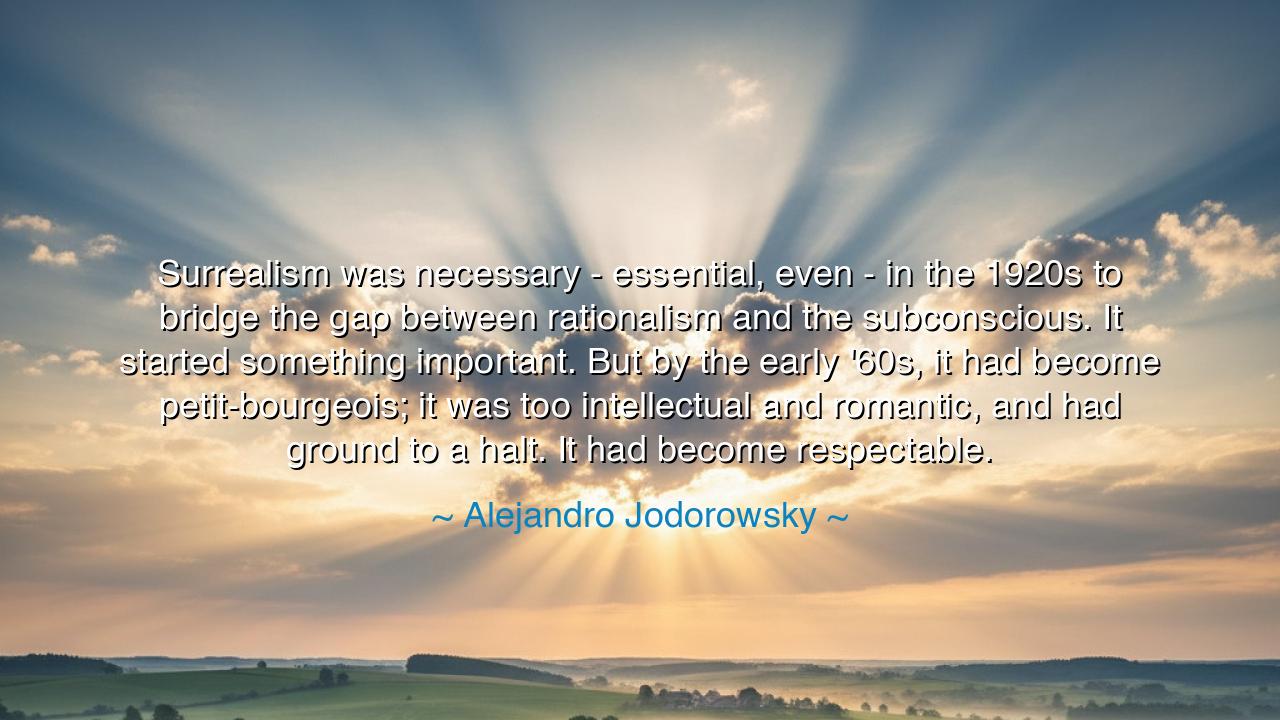
Surrealism was necessary - essential, even - in the 1920s to
Surrealism was necessary - essential, even - in the 1920s to bridge the gap between rationalism and the subconscious. It started something important. But by the early '60s, it had become petit-bourgeois; it was too intellectual and romantic, and had ground to a halt. It had become respectable.






“Surrealism was necessary—essential, even—in the 1920s to bridge the gap between rationalism and the subconscious. It started something important. But by the early ’60s, it had become petit-bourgeois; it was too intellectual and romantic, and had ground to a halt. It had become respectable.” So declares Alejandro Jodorowsky, seer and artist of visions, reminding us that movements of the spirit are born not only of beauty, but of necessity. His words speak to the origin, the decay, and the destiny of Surrealism: born as rebellion, living as revelation, and fading, as all things do, when it lost its fire.
In the 1920s, Surrealism rose as a storm against the prison of rationalism. Europe, wounded by the carnage of the First World War, no longer trusted pure reason. Rational order had led to mechanized slaughter, to trenches filled with bodies. In this age of despair, the poets and painters turned inward, seeking the subconscious, the dream-world, the irrational wellspring of the soul. Through the brush of Dalí, through the words of André Breton, through the visions of Max Ernst, they created a new language—wild, fractured, dreamlike—that sought to heal the rift between mind and heart. This was Surrealism’s glory: to reveal that the irrational could be as sacred as the rational.
But as Jodorowsky laments, no flame burns eternally if it loses its fuel. By the 1960s, Surrealism had hardened into intellectual exercise, admired in galleries but no longer shocking, no longer vital. What had once been a spear hurled at convention had become respectable, folded into the very order it sought to overturn. This is the fate of many movements: what begins as fire often ends as ash, not because it was false, but because it was victorious. Surrealism had triumphed so thoroughly that its rebellion became part of the cultural furniture, no longer dangerous, no longer alive.
The ancients, too, warned of this cycle. Heraclitus taught that all things flow, that strife and change are the essence of life. To remain alive, a vision must be in motion; once it rests, it dies. Surrealism was a living river in the 1920s, carving valleys through the stone of convention. By the 1960s, it had pooled into a pond, still and “petit-bourgeois,” admired but without power to cut new paths. Jodorowsky saw this, and as a prophet of the strange, he mourned that what had been a sword was now a museum piece.
History repeats this cycle again and again. The early Christian church, once radical, challenging empires, was in time absorbed into empire itself, clothed in power and pomp. The Romantics, once revolutionaries against cold Enlightenment reason, became academic subjects studied by the very institutions they defied. The fate of Surrealism is but another echo of this eternal rhythm: what begins in fire must either adapt or perish in embers.
Yet Jodorowsky’s words are not only lament, but a challenge. They remind us that every age requires its own bridge—its own way of binding the visible to the invisible, the rational to the irrational, the waking world to the subconscious. Surrealism was essential for the wounds of the 1920s, but new wounds demand new art. Respectability is death to revolution; therefore, each generation must dare to seek its own madness, its own vision, its own act of creation that shocks the world back into wonder.
The lesson is clear: honor the movements of the past, but do not let them bind you. Do not mistake their respectability for vitality. If you are an artist, a thinker, a seeker, then ask yourself—what is the bridge we need today? What convention must be shattered? What subconscious truth must be brought into the light? Create not to imitate the fire of others, but to ignite your own. For as Jodorowsky teaches, every true movement is born not from desire for acceptance, but from the necessity of the soul.
Therefore, beloved listener, carry this wisdom: Surrealism once burned, but its ashes are not enough. Find your own flame. Do not be content with what is respectable, for respectability kills wonder. Instead, be faithful to the subconscious whisper, the dream that will not let you rest, the vision that unsettles even you. For the world does not need repetition—it needs new bridges, built by those who dare to walk where no path yet exists.






AAdministratorAdministrator
Welcome, honored guests. Please leave a comment, we will respond soon